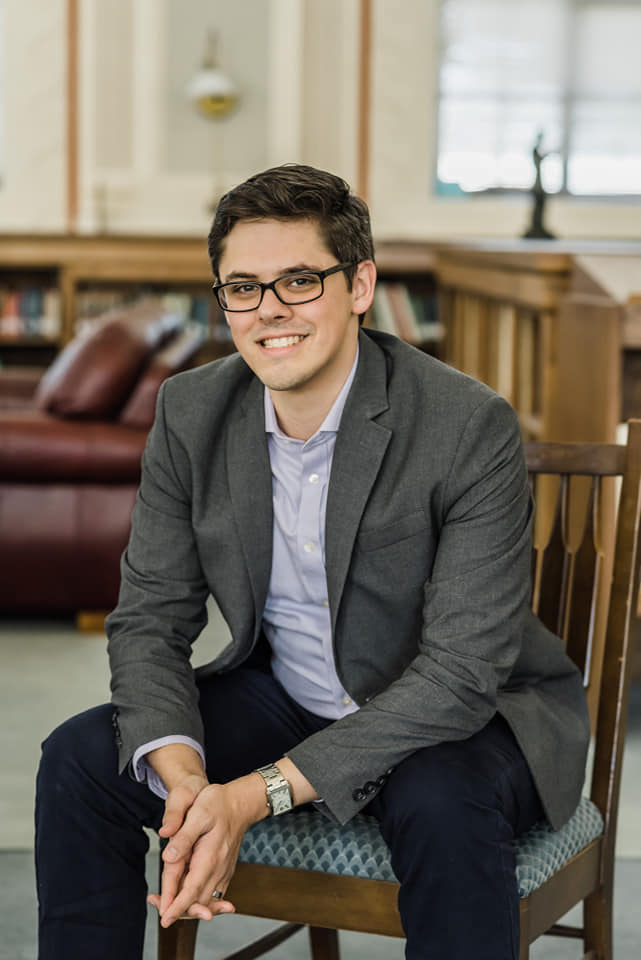English Professor named 2023 College English Teacher of the Year
By Alex Pologruto | Feb 8, 2023

MURRAY, Ky. – Dr. Ray Horton, assistant professor in the Department of English and Philosophy at Murray State University, has been named the 2023 College English Teacher of the Year by the Kentucky Council of Teachers of English/Language Arts (KCTE/LA), a state affiliate of the National Council of Teachers of English.
Each year, KCTE/LA recognizes teachers at the elementary, middle grades, high school and college levels who excel in their duties as teachers, mentors to students and as teacher-leaders in their buildings, districts and beyond. The winning teachers, one at each grade level, will receive a plaque, a free one-year membership to KCTE/LA and recognition at the annual conference in early March.
“My first response, I'll admit, was shock,” said Horton. “I didn't know I had been nominated, and we all get so many spam emails – ‘you're our millionth customer! click here to claim your major award!’ – that I first wondered if it was some sort of prank. But then I realized it was from KCTE, and when the reality of it set in, I just felt incredibly honored. There are so many phenomenal teachers in my department alone, not to mention across the entire state, so this is a tremendous recognition.”
Horton received his Bachelor of Arts from Mercyhurst University, and his Master of Arts and Ph.D. from Case Western Reserve University. He joined Murray State’s Department of English and Philosophy in fall 2017 and teaches composition, Humanities, Honors and undergraduate and graduate American literature courses. In addition, he has served as a faculty member of the Commonwealth Honors Academy, a faculty advisor and a faculty sponsor of the English Student Organization. In 2022, Horton received a Board of Regents Teaching Excellence Award from Murray State.
For Horton, teaching literature provides an opportunity to revisit texts that he loves in the company of his students, who always bring new perspectives to those texts.
“I often teach Marilynne Robinson's Housekeeping and James Balwin's Giovanni's Room in the American literature survey, for instance, and although I have written extensively on Robinson, although I wrote a dissertation chapter on Baldwin, and although I have taught both these novels at least half a dozen times in as many years, my conversations with students invariably open up these texts in ways I hadn't previously appreciated,” said Horton. “Watching students develop their own unique insights about texts and writers that are new to them but very familiar to me helps me to learn alongside them, reminding me of how rich and multifaceted the study of literature can be. You never really exhaust a text's possibilities, and I rediscover this fact most often in the classroom.”
Many of Horton’s students are future English teachers themselves. Horton recognizes that being an educator these days is especially challenging, and he encourages pre-service teachers to remember the unique opportunity they have to make a difference in their students’ lives.
“Few people become English teachers, at any level, without a genuine commitment to their subject and their students,” said Horton. “Educators nationwide remain some of the most underpaid yet relentlessly criticized professionals in the country, and whether it's the challenges of high faculty turnover and anti-intellectual legislation and media coverage currently facing secondary education or the de-professionalization of the labor force and the ongoing decline in tenure track job openings for English professors at the postsecondary level, our discipline faces what I and many others perceive to be an existential crisis. Or, if not a crisis, we at least stand at a very important crossroad.”
“My advice to future English teachers, then, is that you already know the challenges we're facing, and you have chosen to confront those challenges for the sake of building a better future. And as you begin the lifelong process of figuring out who you are in the classroom, you will also know what your students need from you better than any crusading talk show host or politician.
“Keep believing that a better world is possible, and know that by giving your students the room they need to explore, to think and to question, by inviting them into dialog with some of the most creative and critical minds in history every time you lead a class discussion, you are laying a foundation for a future that will treat human beings as more than just human capital. Your work matters, and so do you.”
For more information on the Department of English and Philosophy at Murray State University please visit murraystate.edu/english.
